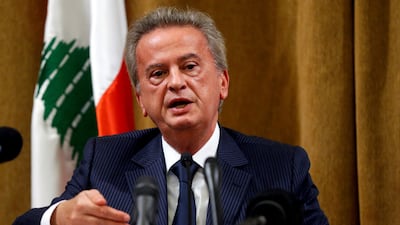The French judiciary has issued an arrest warrant for Lebanon's central bank head Riad Salameh after he failed to attend a hearing in Paris on Tuesday, two sources told The National.
Mr Salameh, his brother Raja and the central bank chief's assistant are being investigated in Lebanon and at least six European countries over the alleged embezzlement of more than $330 million from the Lebanese central bank.
AFP news agency reported that the judge had issued an international arrest warrant.
Judges could now also request an Interpol red notice, which would serve as a global call to law enforcement agencies to find and temporarily detain him. This would effectively prevent him from leaving Lebanon which rarely complies with such notices.
Mr Salameh said the arrest warrant “constitutes a clear violation of the most basic laws,” including French and international laws, and that he will appeal it.
In a communiqué released on Tuesday, Mr Salameh said the French investigation neglected the “confidentiality of investigations”, and contradicted “the presumption of innocence” in its approach, and in its selective application of texts and laws.
The French judge “has made her decision based on preconceived ideas without giving any value to clear supporting documents”, he said.
“This is the justice built on double standards that is being applied here!”
No show at hearing in Paris
The hearing was set for 9.30am on Tuesday, according to court documents seen by Reuters, at which French prosecutors intended to press preliminary charges and formally name Riad Salameh as a suspect.
The National reported on Monday that he had failed to respond to a summons sent by the Lebanese judiciary for the hearing in France.
Beirut judge Charbel Abou Samra tried to contact Mr Salameh to make him aware of the hearing on three occasions, but the governor ― or a representative who could sign for him ― could not be reached.
All the notification letters were returned to the Lebanese judiciary.
The date for Tuesday’s hearing was set last month and Lebanon lifted a travel ban on Mr Salameh for him to make the journey.
Reuters reported that another judicial source said defence lawyers for the Salamehs and for the central bank chief's assistant Marianne Hoayek had submitted an objection to Lebanon's judiciary over the French case, saying France should not be allowed to try a case already being investigated in Lebanon.
The three have been charged in two separate cases in Lebanon. The Salameh brothers have denied any wrongdoing.
Lebanese banker and former minister Marwan Kheireddine has already been indicted by a court in Paris “for aggravated money laundering charges and participation in a criminal conspiracy”, the French deputy financial prosecutor said in April.
He is suspected of having falsified banking documents supposed to account for Riad Salameh's wealth.
In July 2022, Anna Kosakova, a former partner of the central bank governor, was placed under formal investigation in France over alleged criminal conspiracy, organised money laundering, and aggravated tax fraud laundering.
During a visit to Lebanon in March, a delegation of European prosecutors questioned Riad Salameh about the Lebanese central bank’s assets and investments outside the country, a Paris apartment – which he owns – and Raja Salameh's brokerage firm Forry Associates.
Investigators are looking into whether Forry was used as a vehicle to siphon off the state funds.
The visit by the judicial delegation was one of several they have made this year.
Riad Salameh, 72, has held his post for almost 30 years but is expected to step down when his term ends in this summer ― although a successor has not yet been lined up. He insists he has made his money through his previous earnings as an investment banker, investments and other legal ways.
As the long-term head of the central bank, he has been one of the key figures held responsible for the 2019 economic collapse in Lebanon that has been blamed on decades of mismanagement and corruption among the country's ruling elite – including its banking sector.
The financial crisis, described as one of the worst in modern history, has plunged much of the population into poverty, with soaring inflation and the introduction of informal capital control laws that have locked depositors out of much of their life savings.

